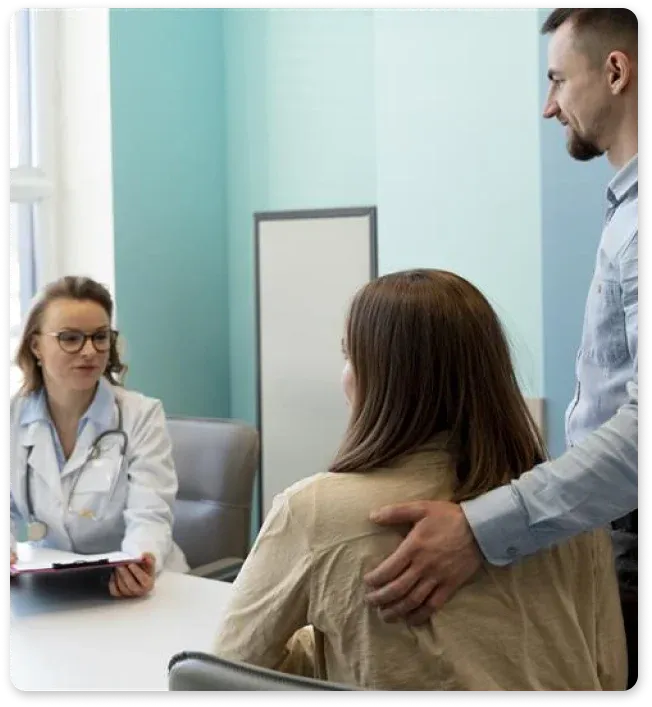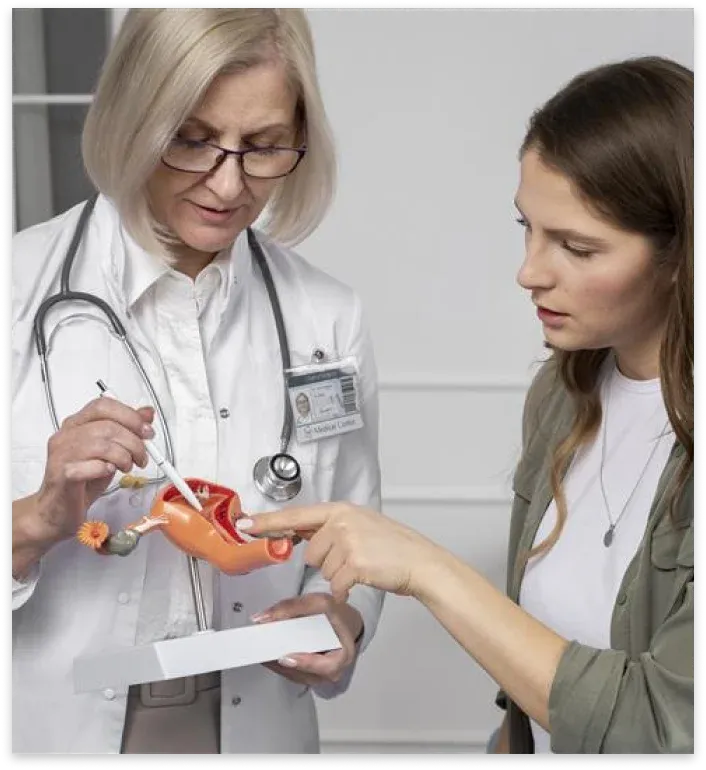Reproductive hormones are the hormones that are meant for, as the name
suggests, sexual activity, development, and reproductive processes. The sex
hormones in males are “androgens”, the main of which is “testosterone” while
the sex hormones in females are “estrogen”, “progesterone”. The male hormones
are produced by the testes, while in females sex hormones are produced by the
ovaries. So, the testes and ovaries are the main sexual or reproductive organs
in males and females respectively. The female hormones are responsible for
menstruation, puberty, pregnancy, menopause, sex drive, and more. Similarly,
male reproductive hormones are responsible for sex drive, sperm production,
puberty, and more.
The pituitary gland releases, carries, and stimulates other reproductive
hormones such as:
- Human Chorionic Gonadotropin (HcG)
- Prolactin
- Luteinizing Hormone (LH)
- Follicle-Stimulating Hormone (FSH)
The endocrine system consists of various organs that are responsible for
producing hormones, testes and ovaries are a part of this endocrine system and
they are directly related to the sexual activity and reproduction in males and
females. R-endocrinology deals with all the matters involving the endocrine
system and hormones. As reproduction is closely related to endocrinology,
R-Endocrinology deals in specialized issues regarding sexual and reproductive
health both in males and females.
Reproductive hormonal disorders:
Reproductive hormones basically control and the sexual organs, their
functioning and reproductive processes overall. They are the main stimulators
behind the reproductive activities. Any kind of disruption or disorder in
reproductive hormones affects the sexual health of an individual, impacting
overall body. The impact is not only physical in such instances; the impacts
are widely spread including impacts on mental and emotional well-being.
R-Endocrinology and our experts are very well aware of the sensitivity and
complexity of reproductive hormonal disorders in males and females, our health
professionals are well-trained to deal with any such disorder in the best
possible manner, not only with the physical aspect but also with the emotional
aspect of it.
Male reproductive hormonal disorder:
Testosterone Deficiency:
Male hypogonadism is a medical or hormonal condition where male sex organs
i.e. testicles do not release enough testosterone. It simply can be called low
testosterone level or testosterone deficiency in men too. Testosterone level
needs to be at a certain level for it to carry out functions it has to perform
in males. These functions include maintaining sex organs, bone density, muscle
mass, body and facial hair, deeper voice and more. Testosterone is needed in
men to produce sperms that are essential for sexual activity then.
Symptoms of low testosterone level in men include:
- Exhaustion and fatigue
- Low sex-drive
- Loss of body hair
- Loss of muscle mass
- Depression and anxiety
- Erectile dysfunction
Causes of low testosterone level in men can be:
- An accident that might have damaged testicles.
- Removal of testicles due to cancerous growth.
- Exposure to radiations.
- Obesity.
- Aging.
- Use of medication.
- Less testosterone level by birth, ambiguous gender and many more causes can
be attributed to it.
- Diabetes
- Drug abuse
Treatment:
Testosterone gels: There are testosterone skin gels or patches that are
applied on the skin. Also, there are testosterone nasal gels that help improve
testosterone levels in the body.
Injections: These are intramuscular injections that boost testosterone levels
in the body. These injections usually have to be administered every 1 or 2
weeks.
Oral treatment: For increasing testosterone levels, there are tablets
available that are sticky ones applied over the gums that help absorb them
easily into the bloodstream. Other than that, a pill for low testosterone
level is available which is mostly used for conditions is where testosterone
levels are low by birth.
Pellets: These are under-skin implants that provide long-term and consistent
results.
Female Reproductive Hormonal Disorders:
Amenorrhea:
Amenorrhea refers to a condition of missed menstrual cycle. It can be a missed
cycle for one month or for consecutive months. Menstruation is controlled by
hormones. Hormones basically prepare uterus for pregnancy every month, when
there is no pregnancy, the uterine lining is discarded of body. That actually
is period. There are two types of Amenorrhea:
- Primary Amenorrhea: The condition where a girl, above 15 of age has been
experiencing puberty in different ways but hasn’t experienced her first
period.
- Secondary Amenorrhea: Secondary Amenorrhea is a condition where a girl has
been getting regular period but stops having it for a few months.
Symptoms:The symptoms include:
- Dryness around vagina
- Hot flashes
Acne Hair growthCauses:
Genetic issues in case of primary amenorrhea, hormonal issues arising from
pituitary glands, abnormal growth of organ.
</li>
Menopause Pregnancy Lactation Uterus removal surgeries or intervention in uterus</ul>
Polycystic Ovary Syndrome:
Polycystic ovaries are the ovaries that have large follicles. These follicles
are usually harmless but their presence in the form of sacs restricts the
production of eggs resulting in delayed or absent ovulation. These follicles
or cysts develop due to an increased production of androgens. Androgens are
male sex hormones and are present in females in very small quantities. The
presence of androgens in large amounts leads to abnormality in ovaries, due to
which cysts are formed.
Symptoms:
The symptoms include:
- Irregularity in menstruation cycle
- Infertility
- Abnormal growth of body hair
- Weight gain
- Acne
- Pain in stomach
Hirsutism:
Hirsutism is another hormonal condition characterized by abnormal, unexpected
and unwanted growth of hair. This growth also usually occurs in the parts
where hair does not grow. This a disorder that takes place due to
irregularities in the endocrine system. These conditions are most of the times
treatable and manageable. R-Endocrinology offers treatment in these areas and
has experts dealing with such issues that are quite often embarrassing for
teenagers/women to discuss. A professionally trained team can deal with such
situations very wisely and fruitfully.
Turner syndrome:
Turner syndrome can be defined as a genetic hormonal disorder that takes place
usually in one of every 2,500 females. Young girls are impacted by this
syndrome in various ways, prominently encompassing the female reproduction
system. Turner syndrome maneuvers standard body development and impedes usual
changes that are normally the outcome of puberty when a child transitions to
adulthood. Additional health difficulties might also be caused that concern
the heart or renal system (i.e., kidneys), although these health difficulties
and the severity of each of them would be different among different women.
Most of the health complications disturbing girls with Turner syndrome can be
coped or altered with suitable medical treatment.
Premature ovarian failure:
Premature ovarian failure, also named as, hypofunction is a condition that is
associated to the restrained function of the ovaries plus declined creation of
hormones in the female reproduction system. Ovarian hypofunction can be
instigated by genetic endocrine disorders and factors such as chromosome
abnormalities, or it may occur with certain autoimmune disorders that disrupt
normal ovarian function. Additionally, women undergoing chemotherapy or
radiation therapy for cancer treatment may experience premature ovarian
failure.
R-Endocrinology offers modern equipment and techniques to deal with the
physical and emotional aspects of all above mentioned hormonal disorders.
Reproductive hormonal disorders can be physically as well as emotionally
draining. Therefore, R-Endocrinology attaches vital importance to the
treatment in the best possible manner with the best possible techniques.
With this, R-Endocrinology has the latest equipment, testing facilities,
health experts, doctors and supporting staff, who are there to diagnose, treat
and manage the patient with utmost care and compassion. Additionally, our
services are internationally recognized and sought after.







